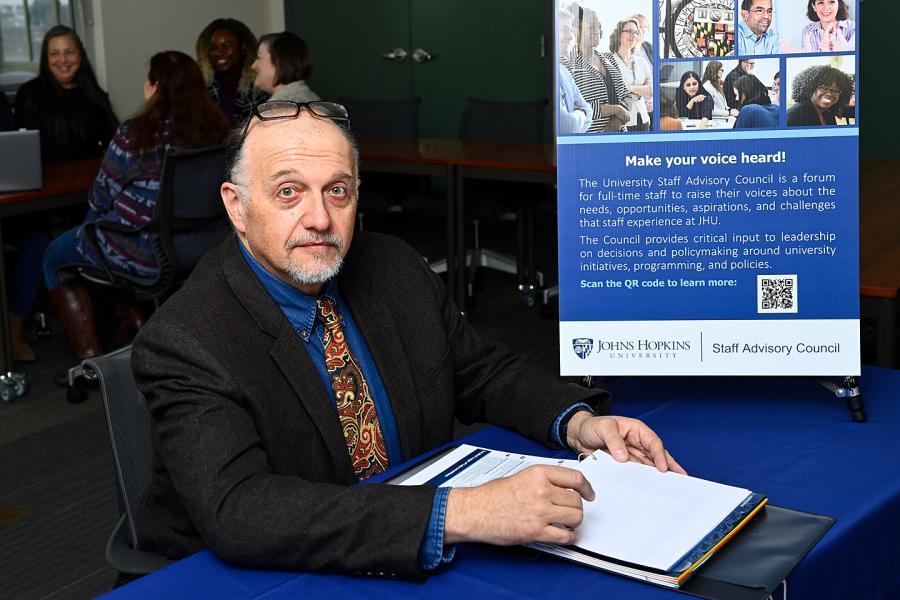You will soon see tables appearing some mornings and afternoons at university "hot spots," that is, locations with heavy pedestrian traffic. If you are one of the more than 12,000 staff members who work at Johns Hopkins University, consider stopping for a few minutes to discover why the tables are there.
It could change your professional life. Moreover, doing so also could transform the JHU work experience for many of your colleagues.
"This is an opportunity to directly create change and advocate for your peers," says Michael McCormick, staff advisory support specialist for the soon-to-be Staff Advisory Council. "It's an incredible chance to express concerns, suggestions, and other ideas."
The people running the tables will encourage you to consider running for a spot on the SAC, which will have 37 elected and five nonvoting members; the members will represent the many organizational levels, job areas, and functions across JHU. They will meet regularly with university leadership to directly voice issues of concern to staff and provide input on policy matters and decision making. You can nominate yourself.
A planning group of more than 30 people from across the university recently completed its task of setting up the council's structure and processes, including nominations and elections. The creation of this first-ever council is an important goal of the Second Roadmap on Diversity, Equity, and Inclusion and Ten for One strategic framework as the university seeks to foster a more dynamic workplace and ensure that its campus environment is one in which all its staff can thrive personally and professionally.
The range of issues the council will take up could include questions and concerns about such topics as benefits, parking, workspace issues, and others. The council also intends to organize programming and events that celebrate and recognize staff and that support their growth and development, and it plans to work with ex officio members selected from the population of divisional business officers and Human Resources. Participation is voluntary and regarded as work time.
The agenda will cut across more than one school as well as JHU's nonacademic divisions. Divisions and departments that already have their own individual staff councils will be able to bring their representative groups and concerns into larger discussions with the full council.
"If you have been someone who until now has sat back and watched things happen, or you are brand new to Hopkins and you think something could be better, think seriously about running for this council," says McCormick, whose job it is to ensure things run smoothly for the council, first with the election of its members, later after they begin to meet and start functioning.
"You could become part of something that is new and exciting," he adds. "This is the first time that staff has had an opportunity to be heard in this way. You will have unparalleled access to university leadership, which is completely supporting this initiative."
The critical task at this moment is to advance the self-nominating process and convince potential participants that they can make a difference for their peers, he says. All the campus sites will have signs announcing the process and be staffed by individuals who can answer questions about the council, elections, and eligibility to represent their division.
"It's a great chance to work with so many people, strengthen relationships, and build a network," McCormick says. "You will have increased visibility, even advance your own career. The most important message we want to get across: Your voice matters."
The self-nomination period is open through Dec. 22, and the process is simple: Just fill out a one-line form posted on the Staff Advisory Council website or use the QR code included in the materials at the tables. Your leadership and divisional HR will review your nomination to make sure you are eligible to run. "Anyone who is a full-time staff member can run and vote," McCormick says. "If you have someone in mind who would be a great council member to serve for your school or division, encourage them to complete the self-nomination form," he says.
Elections are anticipated to take place in January and will be conducted online through the website. Once the votes are in, "we plan to have an orientation and first meeting shortly thereafter," McCormick says.
Virtual and in-person information sessions are being scheduled for those who want to learn more (any additions will be posted here). They'll be held:
- Friday, Dec. 1, 2 to 2:30 a.m., over Zoom
- Monday, Dec. 4, 3 to 3:30 p.m., over Zoom
- Wednesday, Dec. 6, 8:30 to 11 a.m., MSEL, Homewood
- Wednesday, Dec. 6, 1 to 3 p.m., School of Nursing lobby, East Baltimore
- Thursday, Dec. 7, 1 to 3 p.m., Mudd Hall atrium, Homewood
- Monday, Dec. 12, 10 a.m. to 1 p.m., Hopkins Bloomberg Center, D.C.
There likely will be about six meetings a year with university leadership, as well as regular meetings of the council itself as needed, McCormick says. "After the first meeting, they will decide on important subject areas and form subcommittees, which also will meet as needed," he says. "Meetings will take place during work hours, as this is considered service to the university. Supervisors and managers will be asked to support their staff who have won a seat on the council."
There is no additional pay. "But an occasional catered lunch might well be part of the deal," he says.
Posted in News+Info
Tagged hr newswire, staff advisory council








